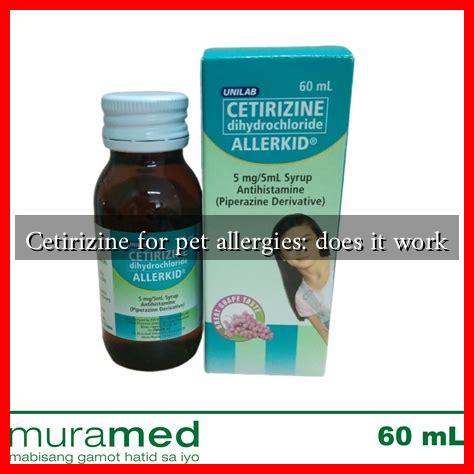-
Table of Contents
Cetirizine for Pet Allergies: Does It Work?
Pet allergies can be a significant concern for both pet owners and their furry companions. Just like humans, pets can suffer from allergic reactions to various environmental factors, including pollen, dust mites, and even certain foods. One medication that has gained attention for managing these allergies is cetirizine, an antihistamine commonly used to treat allergic rhinitis and other allergy symptoms in humans. But does it work for pets? This article explores the efficacy of cetirizine for pet allergies, its safety, and considerations for pet owners.
Understanding Cetirizine
Cetirizine is a second-generation antihistamine that works by blocking the action of histamine, a substance in the body that causes allergic symptoms. It is often prescribed for conditions such as hay fever, hives, and other allergic reactions. In veterinary medicine, cetirizine is sometimes used off-label to treat allergies in dogs and cats.
How Cetirizine Works for Allergies
When an allergen enters the body, the immune system responds by releasing histamines, leading to symptoms such as itching, sneezing, and inflammation. Cetirizine helps alleviate these symptoms by:
- Blocking histamine receptors, reducing the allergic response.
- Decreasing inflammation and swelling in the nasal passages.
- Providing relief from itching and discomfort associated with skin allergies.
Effectiveness of Cetirizine in Pets
While cetirizine is primarily designed for human use, many veterinarians have found it to be effective for treating certain allergic conditions in pets. Some studies and anecdotal evidence suggest that cetirizine can help manage symptoms in dogs and cats suffering from allergies. For instance:
- A study published in the Journal of Veterinary Internal Medicine indicated that cetirizine could reduce pruritus (itchiness) in dogs with atopic dermatitis.
- Veterinarians often report positive outcomes when using cetirizine for pets with seasonal allergies, particularly during high pollen seasons.
Dosage and Administration
Determining the correct dosage of cetirizine for pets is crucial. The typical dosage for dogs is around 0.5 to 1 mg per kilogram of body weight, administered once daily. For cats, the dosage is generally lower, around 0.5 mg per kilogram. However, it is essential to consult a veterinarian before starting any medication, as individual needs may vary based on the pet’s health status and specific allergy symptoms.
Safety and Side Effects
While cetirizine is generally considered safe for pets, some side effects may occur. Common side effects include:
- Drowsiness or lethargy
- Dry mouth
- Gastrointestinal upset
In rare cases, pets may experience more severe reactions. Therefore, monitoring your pet after administering cetirizine is essential, especially during the initial doses. If any adverse reactions occur, contact your veterinarian immediately.
Alternatives to Cetirizine
While cetirizine can be effective, it is not the only option for managing pet allergies. Other treatments include:
- Antihistamines like diphenhydramine (Benadryl)
- Topical treatments such as hydrocortisone creams
- Immunotherapy (allergy shots)
- Dietary changes to eliminate food allergens
Conclusion
Cetirizine can be an effective option for managing allergies in pets, particularly for those suffering from environmental allergens. Its ability to alleviate symptoms such as itching and inflammation makes it a valuable tool in veterinary medicine. However, pet owners should always consult with a veterinarian before starting any medication to ensure safety and appropriateness for their specific situation. With proper guidance and monitoring, cetirizine may provide much-needed relief for pets struggling with allergies, improving their quality of life and comfort.

